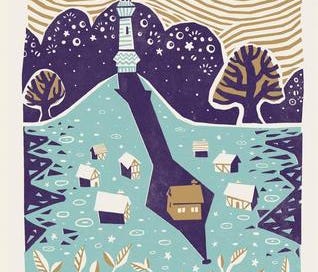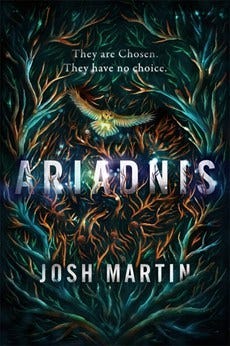I just read Lord of the Rings for the first time and here’s my take away: it’s like, the OG treehugger’s book. Before Suzanne Simard and Peter Wohlleben and Richard Power’s The Overstory there was this eccentric professor who loved languages and heroism and ended up writing a 1000+ page tome that’s as much about keeping trees in forests and hills green as it is about anything else.
What struck me in particular was its magic, and the narrow, out-of-the-corner-of-your-eye ways it appears. Yes, there are magic words, yes there are flashes of light, telepathy, possessions - but always above and beyond that I felt the power of the natural world: the cold of the mountains, the blistering heat of the lands of Mordor, the cool shade of Fangorn forest. In Middle Earth, nature is not the stronger magic, but the oldest magic: the place from which all the magic came. It’s an idea that many myths from all over the world explore, but I hadn’t expected to find these themes laid out so clearly and carefully in the fantasy story I assumed had nothing fresh for me to look at.
It made me think about how fantasy fiction has always been about how humans impact the world around them, even when it isn’t trying. Magic often seems to be speaking to a particular kind of interaction between humans and nature. If you look closely, you can see patterns forming. Some stories relate a binary of magics: one which imposes itself through order and a another that muddles along in chaos.
This division can often create a binary in morality as well - in Garth Nix’s Old Kingdom series, chaos is characterised as an imposition to our protagonists and must be defeated or restructured in order to restore balance. In a world where the dead won’t stay dead and Free Magic erodes the fabric of reality the magic wielders must take up the position of the imposer - restoring the natural order in the face of raw and unwieldy elementals. Nix’s Charter Magic harnesses the power of Free Magic by forcing it into sense and symbols, but doing it skilfully is hard, and the order that Sabriel, Lirael et al are obliged to carve onto the world around them is deliciously slippery and hard won. The world of the Old Kingdom is naturally chaotic, always trying to slide back into mess and corruption and there is a sense that the battle of the Abhorsens is ongoing and eternal.
In its first pages, we find a similar attitude towards chaos/magic in Naomi Novik’s Uprooted. Agnieszka’s world is a forest, and the demons and monsters can pass their corruption to anyone with frightening ease: a touch, a scratch, or even a lungful of bad spores can do it. But as Agnieszka’s indenture to the local wizard (known as the Dragon) progresses and her aptitude for his straight-laced, single-minded magic exhausts her, she gradually learns there is another way. From [Baba] Yaga’s scribbled notebook, Agnieszka learns a magic that exists between chaos and order - that pushes chaos gently in the direction of balance rather than exerting a powerful will over it (It’s beautifully described and executed, and evoked for me the exact feeling I have as a writer when I’m in the process of inventing, making something up but trying to balance pure creativity with narrative sense).
There are echoes of Ursula Le Guin’s Earthsea in this magic, particularly some of her wonderful passages from the fourth Earthsea novel, Tehanu, in which our protagonist, Tenar, contemplates how this other, less obvious magic is more innately feminine (apologies for the long quote but if you haven’t read it I certainly hope to intrigue you enough to give it a go):
“The best I can say, it's like this. A man's in his skin, see, like a nut in its shell ... It's hard and strong, that shell, and it's all full of him. Full of grand man-meat, man-self. And that's all. That's all there is. A woman's a different thing entirely. Who knows where a woman begins and ends? Listen mistress, I have roots, I have roots deeper than this island. Deeper than the sea, older than the raising of the lands. I go back into the dark ... I go back into the dark! Before the moon I am, what a woman is, a woman of power, a woman's power, deeper than the roots of trees, deeper than the roots of islands, older than the Making, older than the moon. Who dares ask questions of the dark? Who'll ask the dark its name?”
Le Guin seems to be reflecting on how so much of patriarchal norms have been established out of enviousness for this deep-seated magic: as old and natural as anything is old and natural.
For me, it’s such a pertinent comment on our modern predicament: that men’s (and more broadly, patriarchy’s) unwillingness to stand still and listen and try to learn from this older, deeper magic is doing as much damage to the natural world that reflects it as it is to women, queer people and anyone who cannot hope to walk along patriarchy’s narrow precipice.
This seems to be the lesson that more and more writers are pointing to: embracing wilderness, not from the patriarchal sense of survival, but in the sense of allowing a wildness to grow around you, to curb the impulse to impose yourself upon wilderness and find the points where you are needed, where you can help wilderness to thrive.
We’re seeing that kind of philosophy in many, many nature books at the moment, but we’re also seeing a resurgence in popularity in the kind of fantasy and sci-fi that nurtures this outlook. I feel a nervous yearning, as I’m sure many people do, for the ending promised in Disney Movies: where things are returned to as they were before, and yet I know that the more mature outlook presented Studio Ghibli’s Nausicaä or Princess Mononoke is the one to hope for - not a redemption but a promise of healing and regrowth. It’s the same note I tried to leave my reader with when I wrote my first book, Ariadnis, which is about the almost-war between two cities on the last island on earth and it’s sequel, which is about struggling to rebuild, but it feels time to move beyond a promise.
I want to be working towards the tentatively optimistic future that Becky Chambers predicts in her novels. I want a sequel to Uprooted that painstakingly details the healing of Agnieszka’s forest and what it looks like when it’s done. It feels like our duty as writers to continue to call attention to the wild magic of nature, to listen to what it’s trying to say and inspire more to do the same.
Josh Martin is the author of Ariadnis, Anassa and several hundred other books that are waiting not so patiently to escape from his brain. Like most writers he comes with a plethora of identities that include mighty tasks like copywriting, screenwriting, teaching creative writing, bookselling and walking his dog. He is currently writing two books simultaneously: an adult novel about a tree and a gun who fall in love and a middle grade novel about magical house-cleaners.
Solutions Spotlight
In this issue’s extract from a book featuring a climate solution, Linda Woodrow shares an extract from 470, her dystopian novel. The scene discusses an economy based on localism - locally grown food, artisanal household goods, refurbishment and repair, producer and consumer in at most two degrees of separation.
Duke would get a carrot today. Trade was good. It was a fine, blue sky autumn day and the market was buzzing so hard even the buskers’ hats were filling with produce and small coins. Stalls overflowed with pumpkins, tomatoes, chillies and cucumbers. There were hands of bananas and pyramids of deep red pomegranates. A young man at the stall next to him had cages of chickens and ducklings and one a few stalls up had tanks of fish fingerlings. A piglet tethered to a post squealed as people tripped over it. Along Doobie’s stretch there was a bosomy woman with a cloud of silver hair who sold herbal medicines, a man selling refurbished electronics and a woman selling vegetables, macadamia butter, tortillas and charcoal.
Doobie was wearing his lucky pink singlet. The singlet was getting very worn now, but his magic always flowed when he was in it. His pouch was heavy with coins, his cart was full of goods and his crypto account in credit.
He had only half a box left of the apples he’d brought down from his friends’ orchard near Stanthorpe. He’d been lucky with the weather – it had stayed cool and dry. But the journey took more than a week and even though he’d packed them carefully, the apples wouldn’t last. He gave one to a woman who passed by singing to herself in a high, sing-song voice. Her pale fair hair was tangled and she was dressed in ragged velvet and lace too heavy for this beautiful warm day. She looked like she needed some sweetness. She thanked him with clasped hands and bowed head.
The Farmers Market Coalition supports local farmers in the USA.






Magical stories in all their iterations. Thanks for a thought-provoking essay. As a science-based cli-fi writer I weave magical realism into my stories to evoke a numinous mood.
Loved this, Josh. Great piece. The Ursula Le Guin quote you pulled made we want to go back and re read every book she’s written.
The feminine principle, in relation Mother Earth, has been buried for centuries…
Looking forward to reading your work.